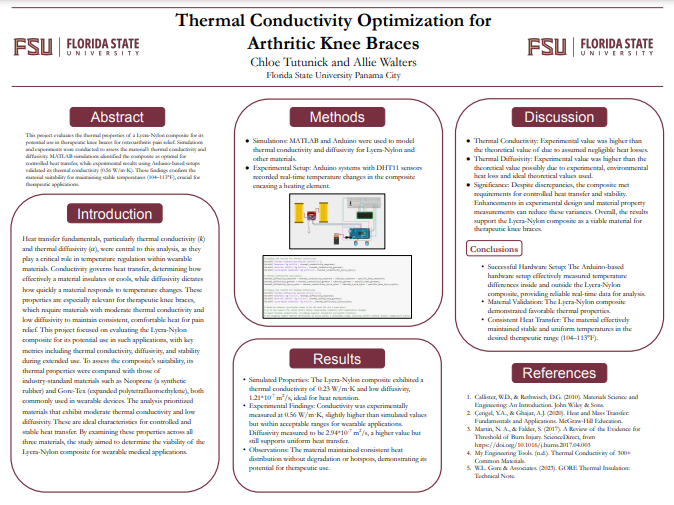Student Research Symposium Program Portal: Submission #20
Submission information
Submission Number: 20
Submission ID: 7501
Submission UUID: cd68991d-66c4-43a1-b348-3bc05c03c4a5
Submission URI: /student-research/symposium/research-symposium-program-portal
Submission Update: /student-research/symposium/research-symposium-program-portal?token=ziR9tWqbiWJ3xKawZKyGSTmLmMIq9VDZYjvxk9T7v1c
Created: Wed, 01/08/2025 - 02:45 PM
Completed: Wed, 01/08/2025 - 02:55 PM
Changed: Wed, 04/16/2025 - 09:01 PM
Remote IP address: 146.201.10.24
Submitted by: Anonymous
Language: English
Is draft: No
Webform: Research Symposium Program Portal WF
Submitted to: Student Research Symposium Program Portal
Chloe
Tutunick
{Empty}

Mechanical Engineering
We are a dedicated and multidisciplinary team from Panama City, Florida, and Wausau, Florida. Our professional interests span a diverse range of fields, including software development, biomedical engineering applications, robotics, and material science. Our shared commitment to advancing technology and innovation across critical domains reflects this.
United by a common goal, we aspire to contribute to military engineering applications, leveraging our combined expertise to develop solutions that enhance national defense capabilities. Our vision encompasses the design and implementation of advanced technologies, such as autonomous robotic systems, cutting-edge materials, and biomedical innovations tailored for military use.
By integrating our diverse skill sets and knowledge, we are committed to addressing complex engineering challenges with precision and creativity. Through this work, we aim to make meaningful contributions to the safety, efficiency, and technological superiority of the military, while advancing our understanding and application of engineering principles.
United by a common goal, we aspire to contribute to military engineering applications, leveraging our combined expertise to develop solutions that enhance national defense capabilities. Our vision encompasses the design and implementation of advanced technologies, such as autonomous robotic systems, cutting-edge materials, and biomedical innovations tailored for military use.
By integrating our diverse skill sets and knowledge, we are committed to addressing complex engineering challenges with precision and creativity. Through this work, we aim to make meaningful contributions to the safety, efficiency, and technological superiority of the military, while advancing our understanding and application of engineering principles.
Thermal Conductivity Optimization for Arthritic Knee Braces
This report investigates the thermal properties of a Lycra-Nylon composite for use in assistive knee devices designed to relieve osteoarthritic pain. The project was divided into two more extensive components: a software-based project focusing on thermal simulations and a hardware-based project emphasizing experimental validation as seen in Appendix C. Due to the intense workload and time constraints, the components were merged into a single project involving two team members. This combined effort allowed the team to focus on heat transfer and material reliability for therapeutic applications while narrowing the scope by deprioritizing a more detailed exploration of moisture transport.
MATLAB simulations were first used to calculate thermal conductivity and diffusivity for three materials: Gore-Tex, Neoprene, and a Lycra-Nylon composite. An arbitrary temperature difference was used for this simulation to compare the different materials. These simulations identified the Lycra-Nylon composite as the most efficient material due to its moderate value for thermal conductivity and low thermal diffusivity making it suitable for controlled heat transfer.
After completing the initial simulation, an Arduino-based setup was developed to determine the experimental thermal conductivity of the Lycra-Nylon composite. The system measured the temperature progression of a heating element and the composite material with DHT11 sensors and output the data using a liquid crystal display. Calculations confirmed the experimental thermal conductivity of the composite to be 0.56 W/m·K, validating its suitability for maintaining the desired temperature range with efficient heat transfer. These findings underscore the Lycra-Nylon composite's potential for precise thermal management applications.
MATLAB simulations were first used to calculate thermal conductivity and diffusivity for three materials: Gore-Tex, Neoprene, and a Lycra-Nylon composite. An arbitrary temperature difference was used for this simulation to compare the different materials. These simulations identified the Lycra-Nylon composite as the most efficient material due to its moderate value for thermal conductivity and low thermal diffusivity making it suitable for controlled heat transfer.
After completing the initial simulation, an Arduino-based setup was developed to determine the experimental thermal conductivity of the Lycra-Nylon composite. The system measured the temperature progression of a heating element and the composite material with DHT11 sensors and output the data using a liquid crystal display. Calculations confirmed the experimental thermal conductivity of the composite to be 0.56 W/m·K, validating its suitability for maintaining the desired temperature range with efficient heat transfer. These findings underscore the Lycra-Nylon composite's potential for precise thermal management applications.
Yvonne Traynham
Florida State University
Mechanical Engineering
ytraynham@pc.fsu.edu
{Empty}
Allie Walters
Materials, Science, Engineering, Mechanical, Coding
C -3
Complete
Face to Face Poster session

No
2025
5th annual Undergraduate Research Symposium, April 17, 2025
https://pc.fsu.edu/student-research/symposium/research-symposium-program-portal?element_parents=elements/poster_pdf&ajax_form=1&_wrapper_format=drupal_ajax&token=ziR9tWqbiWJ3xKawZKyGSTmLmMIq9VDZYjvxk9T7v1c
{Empty}
